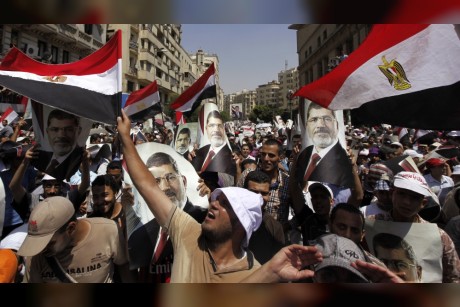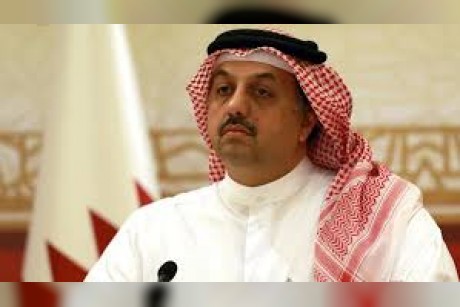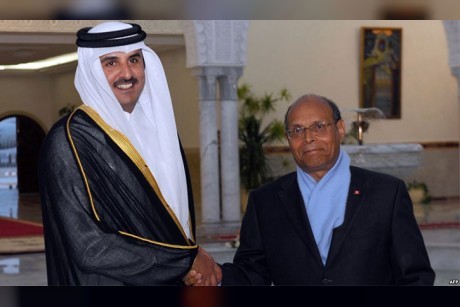In the history of the relationship between Qatar and this group, the first wave of Muslim Brothers reached Qatar in 1954, following their crisis with the late Egyptian president Gamal Abdel Nasser when a decision was made to dissolve the group for the second time in its history.
MB won the trust Qatari leader this time, Sheikh Ali bin Abdullah al-Thani, who created an Islamic movement within Qatar and had a great influence on the conservative Bedouin community in Qatar, which numbered tens of thousands of citizens in the 1950s.
After the clash with Abdel Nasser, nine MB leaders escaped from the companions of the founder of the group, Hassan al-Banna, to Qatar, such as Yusuf Al Qaradawi , who took over the University of Qatar and established the Faculty of Sharia, and leader Abdul Badi Saqr, As the cultural advisor to the ruler of Qatar, and Hassan al-Maayergy who reached the highest positions in the Ministry of Education to the extent that he taught Sheikh Hamad Bin Khalifa.
Ahmed Al-Assal, who worked in Qatar throughout the sixties, and Abdul Halim Abu Shata who authored many books on women in Qatar, Kamal Naji and Azzedine Ibrahim and Abdel Moez Abdul Sattar of the first generation of MB, and wrote Qatari textbooks, and also dominated the legitimate associations and endowments.
The second wave came from Syria in 1982 after the confrontation between the group and former President Hafez al-Assad, known as Hamas.
The third group arrived in the wake of the events of September 11 coming from Saudi Arabia, and reached the fourth wave of the group to Doha after the expulsion of the leaders of the Islamic Resistance Movement “Hamas”, headed by Khaled Meshaal from Jordan, the fifth wave was also Egyptian after the fall of the group and isolated after the June 30 revolution overthrew the rule of the Muslim Brotherhood.
In 1995 Hamad al-Thani took over the emirate and then established Al Jazeera. Doha began looking for a regional role, perhaps international, within the limits of what the Americans allow. In this period Hamad exploited the MB’s existence. The small emirate does not have the tools to make the main conflict, the manpower and geography, and cannot – like other Arab countries produce technology, and therefore relied on the MB as a tool of soft power.
MB in Qatar was funded by Abdulrahman al-Nuaimi , who established Al Karama for Human Rights, headquartered in Geneva , Switzerland.
It has a branch in Doha, and all its members are members of the MB and represent the majority in the international organization of the MB, and “Nuaimi” on the lists of terrorism as a major financier, the terrorist groups in Iraq and the Nasserist Front in Syria and the youth group in Somalia and others.
After the revolution of January 25, 2011, Egyptian Brotherhood leader Khairat al-Shater met with the then Qatari Foreign Minister Hamad bin Jassim and asked him before the Egyptian presidential elections to tell the US that MB would maintain the Camp David Accord and all international relations with Western countries, which Qatar has already provided to the group, through Qatar Islamic Bank, where the funds are transferred to a bank account for the Change Academy run by Hisham Morsi, Qaradawi’s son-in-law.
The revolution of January was a new turning point in the relationship between the two parties. Qatar’s role in sponsoring the Brotherhood grew from a silent embrace to an attempt to exchange interests, especially as the Brotherhood came to power, through the investment or riding of the wave of spring protests, making it easier to provide political cover, financial and media to the Brotherhood, on the pretext of gaining an influential role in its regional policy.
Qatar also played the economy card and withdrew its deposits, loans and aid from Egypt following the June 30, 2013 revolution, after it bribed the Muslim Brotherhood in a blatant attempt to control the capabilities of the Egyptian state. Doha stopped all aid and made terrorist operations another way to drain the Egyptian economy.
The American newspaper “World Tribune” highlighted the desire of the Brotherhood leaders to escape to Qatar, Qatar has become a safe haven for members and leaders of MB, who fled Egypt after the isolation of President MB Mohamed Morsi, as dozens of leaders fled and set up in private homes and give them Qatar income per month, As well as its financial support to those who hold demonstrations and protests in Egypt against the regime.
The newspaper quoted an Arab diplomat as saying that Qatar welcomed the Muslim Brotherhood activists, but asked them to stay away from the spotlight.
Qatar did not only harbor the members of MB fleeing from Egypt, but it worked to ignite sectarian strife between the Muslims and Egyptian Copts, and claimed through Al-Jazeera, the existence of harassment of the Copts in Egypt, and used the organization to advocate the north-east of the country, funded by the targeting of Christians in Sinai, Qatar took advantage of the bombing incidents in the churches of Egypt, to create a state of terror and create a state of frustration in the Egyptian street.
According to specialists in the Islamic groups affairs, all terrorist organizations in Egypt and even the world emerged from the mantle of the Muslim Brotherhood. All threads led and still lead the Brotherhood and their followers in the assassination of Egyptian Attorney General Hisham Barakat, Mohamed El-Beltagy, one of the leaders of the terrorist group, said clearly: “What happens in Sinai will stop at the moment Mursi returns to his post.”



